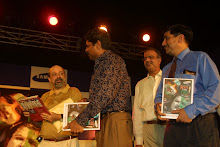New Indian Express, 19/7/09
Shadows Across the Playing Field: 60 Years of India-Pakistan Cricket. By Shashi Tharoor and Shaharyar Khan. Roli Books. 189 pages; illustrated; Rs. 295.
By Gulu Ezekiel
Cricket matches between India and Pakistan have been played since the early 1950s and have always had an edge to them, rivaling even international cricket’s oldest series between England and Australia.
The reason for heightened tensions when the two nations meet is of course wrapped up in history, politics and religion.
Former UN diplomat and current Minister of State for External Affairs, Shashi Tharoor and career diplomat and former head of the Pakistan Cricket Board, Shaharyar Khan (cousin of Mansur Ali Khan, aka the Nawab of Pataudi) have been chosen to trace the stormy history of Indo-Pakistan cricket in this book split between their two essays.
Khan’s choice is a logical one. He has an intimate inside view of cricket in Pakistan and was manager of the teams that toured India in 1999 and 2005.
Tharoor’s links are more tenuous. We are told on the inside flap of the book that he has “encyclopaedic knowledge” of Indian cricket which makes it even more surprising that he has committed so many factual errors in his essay.
What is most striking when comparing the two chapters is the number of issues on which the authors hold diametrically opposing views.
This different reading of history also explains why India and Pakistan have been at loggerheads for over six decades. But it is no bad thing in a book—it gives the reader pause for thought and allows him to make his own judgment.
Take for example the cricket tournaments played on religious lines in Bombay and Poona, the Quadrangular starting in 1912-13 and the Pentangular ending in 1945-46.
Tharoor, a self-confessed Nehruvian takes up Mahatma Gandhi’s point of view that the event was a direct assault on the Congress Party’s ideals of secularism.
Khan is convinced that the success of a separate Muslim team bolstered Jinnah’s two-nation theory and therefore was a positive development. He also quotes the players, including top Hindu cricketers of the time that the matches never led to communal disturbances and in fact acted as a harmless outlet for letting off steam.
Then there is the attitude of Pakistanis to the large number of Muslims who have represented India including four captains. (Tharoor omits Iftikhar Ali Khan, the senior Nawab of Pataudi when listing their names).
This has always been a thorn in the flesh of Pakistan according to Tharoor as evinced by Pakistan captain Shoaib Malik’s communally tinged remark at the end of the 2007 World Twenty-20 final in which India beat Pakistan at Johannesburg.
Khan is defensive when comparing Pakistan’s treatment of its minorities with India. The controversial case of Yousuf Youhana who converted from Christianity to become Mohammad Yousuf is another subject on which the two disagree.
To set the record straight, Yousuf did lead Pakistan in a handful of ODIs as stand-in captain when Inzamam-ul-Haq was either injured or serving out a ban.
However, on Inzamam’s retirement when it came to appointing his successor, it was reportedly the legendary Imran Khan who stressed to the PCB that a non-Muslim should never be appointed as full-time captain of the Pakistan Test team.
Khan has placed on record that the frosty ties between the two cricketing nations was thawed when Pakistan visited India in 1999, their first full tour for 12 years. Indian fans who crossed the border for the 2004 tour were bowled over by the hospitality of their hosts. But it was India that set the friendly trend. Indeed, the warmth with which all of India greeted the very first Pakistan team to visit in 1952 is also a matter of record.
Tharoor’s insistence on recording each and every result—Test, ODI, T-20 Internationals and even tour matches against domestic sides— makes one’s head reel with the endless litany of facts and figures, all of which are recorded in any case at the end of the book. In between he makes scathing attacks on the very basis of Pakistan’s founding and the violent turmoil it has witnessed since.
Some of Tharoor’s more caustic comments may come back to haunt him now that he will have to deal directly with Pakistan’s leaders at the diplomatic level. This book was written before his ministerial appointment.
As for the errors in Tharoor’s essay, they are too numerous to list here. It is about time publishers appointed dedicated and knowledgeable cricket fact checkers to go through manuscripts rather than relying on editors and proof readers who have little or no understanding of cricket.
Finally, Khan’s assertions that there were no official Pakistani links to the 26/11 terrorist attacks on Mumbai is unlikely to carry any weight in India. That outrage and the subsequent attack on the Sri Lankan cricket team in Lahore has practically put finis to any hope of further international sporting events on Pakistan soil, including the 2011 World Cup for which it has already been stripped of its joint hosting rights by the ICC.
Subscribe to:
Post Comments (Atom)

No comments:
Post a Comment